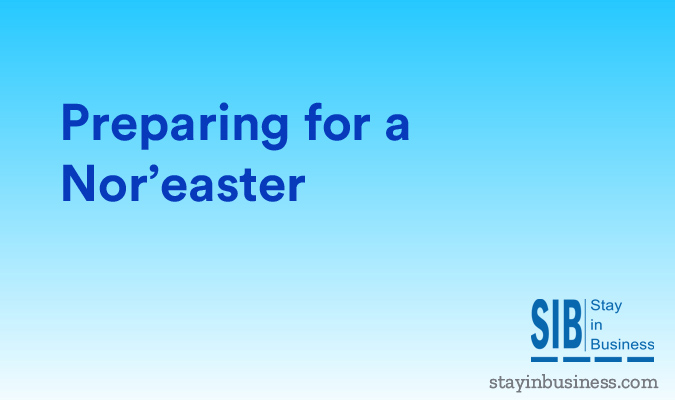Preparing for a Nor’easter

A nor’easter is a harsh winter storm that has winds blowing over the coasts from the northeast. Nor’easters are similar to Hurricanes and have the most probability of occurrence between October and May.
Why you should be prepared
Nor’easters can have devastating effects on businesses and homes. Nor’easters are often accompanied by heavy rainfall and high winds. During winters nor’easters may include heavy snowfall and can last for several days.
Is you business Prepared?
- Massive power outages tend to occur during nor’easters. Homes and businesses lose power, phone lines, heat, and cell towers.
- If power goes out in your building, will you lose valuable data? Will your website go down? Will you lose communication sources with clients, vendors, and employees? How will you communicate if your power goes out? Do you have back up servers, and backup generators?
- Communication is key? Do you have a way to communicate to your employees, partners, clients, and vendors when a nor’easter strikes? How will you let your employees know when to return to work? You will need a communication system which is prepared to handle the complications of a nor’easter.
- Are you receiving weather alerts? Are your weather alerts accurate and timely?
- What protections do you have in place for a flood? Are electronic devices located in a dry safe place? Have you prepared that place for the possibility of a flood? How much damage will a flood do to your infrastructure?
Possible Mitigation Strategies
- Always stay informed about emergencies by subscribing to alerts and public safety messages.
- Have a notification system in place that lets you notify your employees, suppliers and clients about possible business disruptions.
- FEMA’s flood maps can help you in identifying if you are located in an area where floods are common.
- Be ready to evacuate if you are located in an area where flooding can occur.
- An Emergency Kit should be assembled for possible evacuation scenarios.
- Listening to instructions from safety officials can prove to be very useful and life saving during emergencies.
- Always be prepared for possible outages.
- Smoke detectors should always be equipped with fresh batteries.
- Be equipped with a generator to handle prolonged outages.
- If you have critical life support equipments that are dependent on electricity, plan with your provider on handling power outages.
- The possibility of getting a flood insurance through NFIP should always be considered.
Keep your employees, suppliers and customers aware of possible disruptions to your business using SIB’s integrated Emergency Notification System. Perform a threat assessment and develop mitigation measures and recovery strategies that would ensure your business is up and running after a catastrophe. Remember failing to plan is planning to fail.
Categories: Natural Disasters
